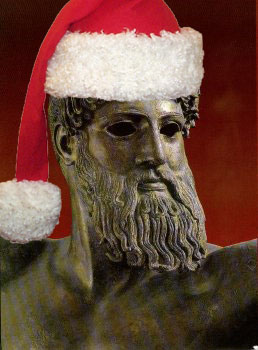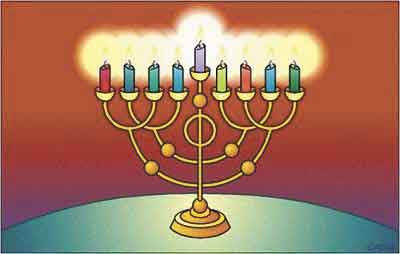Holy War
Kevin E. Cleary
The right-wing media apparently has very little to talk about as Bush’s legislative agenda crumbles with each indictment and revelation of wrongdoing. They could be discussing the bipolar economy which has resulted from the administration’s tax policies: corporate profits have reached all-time highs while real wages have consistently sunk. They could discuss the intellectual dishonesty of a Congress that has raised its own salary by an average of $3,000 almost every year yet thinks raising the minimum wage would be bad for low-wage earners and small businesses. The right-wing media could discuss the accuracy of the Iraqi casualty count Bush flippantly announced after years of stonewalling. They could talk about the deficits this administration have created which make Reaganomics seem like “the good old days.” Instead, they discuss “The War on Christmas.”

Pundits like Bill O’Reilly insist that phrases like “Happy Holidays” and calling Christmas trees “holiday trees” are the left’s covert assaults on a longstanding Christian tradition. I don’t really know what he fears the end result of this so-called war will be, but I imagine his deluded nightmares involve future celebrants goose-stepping to Winter Wonderland in a shopping mall as they purchase Holiday gifts; or something equally frightening. I say this because it’s the only fear I can imagine that would prompt so much attention to be paid to a non-existent war.
In the interest of putting a stupid controversy to rest, I will now indulge in a somewhat rambling history lesson. First and foremost, December 25 was not the day Jesus was born! This was a pre-existing pagan holiday celebrated by the Romans to commemorate the changing of seasons, particularly Winter Solstice. It was adopted as Christmas as a sort of PR move by the early Christian Church. I was taught this in Catholic school, during several different religious courses throughout my eleven years of Catholic education and indoctrination.
The Roman festival was called Saturnalia. The name comes from the Roman god Saturn, who was said to rule over agriculture. He was the honoree of this festival, as the Romans gave thanks for harvesting the fall crops. The feast typically lasted seven days, was considered the greatest festival of the year, and involved feasting, gift-giving, dancing, home decorating, and relaxing, among other things. I’m sure there were Romans at the time who bemoaned the “Christian War on Saturnalia,” but they’re all dead now. I don’t know if they ever considered naming the holiday Jesusalia, but I do know that would be a lot harder to abbreviate, i.e. X-alia.
Speaking of which, I’ve heard a lot of people complain over the years about the use of “X-mas” to abbreviate the word “Christmas.” While I haven’t heard this complaint in regard to the current War on Christmas, I thought I should address this one as well. Writing “X-mas” is not in fact, taking the “Christ” out of “Christmas,” as many believe. I can understand why this would offend certain people, but their offense is actually ill-informed. The X was a symbol for Christ in the early Church and is still used today; in much the same way that the Pisces fish was an early Christian symbol and can still be seen today, like in that Seinfeld episode where Elaine steals her boyfriend’s “Jesus fish.”

 Other traditions, like Christmas trees, also have their roots in earlier pagan religions. While there is some debate as to the earliest origins of Christmas trees, it is known that the Druids saw evergreen trees as symbols of everlasting life because they seemed to live through winter undaunted by the cold. The Romans also cut down evergreens and decorated them for Saturnalia. Mistletoe was a Druid symbol for virility, St. Nick is thought to be the result of a patchwork of mythical gods, like the Greek god Poseidon and the Teutonic Hold Nikar (there is a broad scholarly consensus that St. Nick may never have existed as a person, and instead is an example of Christianized pagan gods), the list goes on and on of Christmas traditions that were actually co-opted pagan traditions.
Other traditions, like Christmas trees, also have their roots in earlier pagan religions. While there is some debate as to the earliest origins of Christmas trees, it is known that the Druids saw evergreen trees as symbols of everlasting life because they seemed to live through winter undaunted by the cold. The Romans also cut down evergreens and decorated them for Saturnalia. Mistletoe was a Druid symbol for virility, St. Nick is thought to be the result of a patchwork of mythical gods, like the Greek god Poseidon and the Teutonic Hold Nikar (there is a broad scholarly consensus that St. Nick may never have existed as a person, and instead is an example of Christianized pagan gods), the list goes on and on of Christmas traditions that were actually co-opted pagan traditions.
 I mention this to stress the point that Christmas could then be viewed as a conglomeration of various holy days and their traditions. Therefore, saying “Happy Holidays” could be viewed as paying respect to those preceding traditions. Additionally, there is the fact that several other holidays are celebrated around the time of Christmas. Jesus, who was Jewish, would have appreciated being told “Happy Hanukkah!” around this time of year. He probably would have been puzzled by people wishing him a happy birthday several months after his likely actual birthday.
I mention this to stress the point that Christmas could then be viewed as a conglomeration of various holy days and their traditions. Therefore, saying “Happy Holidays” could be viewed as paying respect to those preceding traditions. Additionally, there is the fact that several other holidays are celebrated around the time of Christmas. Jesus, who was Jewish, would have appreciated being told “Happy Hanukkah!” around this time of year. He probably would have been puzzled by people wishing him a happy birthday several months after his likely actual birthday.
Furthermore, the assertion that secular leftists are somehow Seussian Grinches who hate Christmas and everything about it does not stand up to the facts. Traditionally, the first people to ban celebrating Christmas were Puritan Christians who left England to form the colonies. Assaults on Christmas have usually come from right-wing religious peoples. The protections of free worship for all have seen some of their greatest defenders come from the left.
Since the American celebration of Christmas is marked largely by adulation of capitalism rather than following Jesus’s sage advice anyway (Blessed are the poor and the meek, etc.), I don’t see why Bill O’Reilly and his ilk are complaining about saying “Happy Holidays.” If they don’t want to be inclusive, they can say “Merry Christmas” to everyone they encounter regardless of the person’s religion. If they find the phrase “Happy Holidays” too bland, I suggest an alternative I have been using for several years: “Happy Hannukwanzmas!” This, in the Christmas tradition, incorporates several holidays into one greeting. It includes Hanukkah, Kwanza, and Christmas. In years during which Ramadan also falls near Christmas, I suggest “Happy Ramahanukwanzmas!” I find these alternatives (which again, I devised years ago... ask my friends and family) to be less cumbersome than the one suggested by the Virgin Mobile commercials.
I hope this has been helpful in putting the War on Christmas to rest, so the media can get back to paying attention to the real wars in Iraq and Afghanistan, where our soldiers and others are sacrificing their lives. Additionally, there is the War on Civil Liberties in Congress over renewal of the Patriot Act, the growing ranks of impoverished Americans, McCain’s successful War on Torture, the millions of Americans who lack essential health coverage, and many other issues which merit media coverage more than this non-controversy. In the mean time, Merry Christmas, Happy Hanukkah, and Happy Kwanza, or Happy Hannukwanzmas and a jolly New Year!
The right-wing media apparently has very little to talk about as Bush’s legislative agenda crumbles with each indictment and revelation of wrongdoing. They could be discussing the bipolar economy which has resulted from the administration’s tax policies: corporate profits have reached all-time highs while real wages have consistently sunk. They could discuss the intellectual dishonesty of a Congress that has raised its own salary by an average of $3,000 almost every year yet thinks raising the minimum wage would be bad for low-wage earners and small businesses. The right-wing media could discuss the accuracy of the Iraqi casualty count Bush flippantly announced after years of stonewalling. They could talk about the deficits this administration have created which make Reaganomics seem like “the good old days.” Instead, they discuss “The War on Christmas.”

Pundits like Bill O’Reilly insist that phrases like “Happy Holidays” and calling Christmas trees “holiday trees” are the left’s covert assaults on a longstanding Christian tradition. I don’t really know what he fears the end result of this so-called war will be, but I imagine his deluded nightmares involve future celebrants goose-stepping to Winter Wonderland in a shopping mall as they purchase Holiday gifts; or something equally frightening. I say this because it’s the only fear I can imagine that would prompt so much attention to be paid to a non-existent war.
In the interest of putting a stupid controversy to rest, I will now indulge in a somewhat rambling history lesson. First and foremost, December 25 was not the day Jesus was born! This was a pre-existing pagan holiday celebrated by the Romans to commemorate the changing of seasons, particularly Winter Solstice. It was adopted as Christmas as a sort of PR move by the early Christian Church. I was taught this in Catholic school, during several different religious courses throughout my eleven years of Catholic education and indoctrination.
The Roman festival was called Saturnalia. The name comes from the Roman god Saturn, who was said to rule over agriculture. He was the honoree of this festival, as the Romans gave thanks for harvesting the fall crops. The feast typically lasted seven days, was considered the greatest festival of the year, and involved feasting, gift-giving, dancing, home decorating, and relaxing, among other things. I’m sure there were Romans at the time who bemoaned the “Christian War on Saturnalia,” but they’re all dead now. I don’t know if they ever considered naming the holiday Jesusalia, but I do know that would be a lot harder to abbreviate, i.e. X-alia.
Speaking of which, I’ve heard a lot of people complain over the years about the use of “X-mas” to abbreviate the word “Christmas.” While I haven’t heard this complaint in regard to the current War on Christmas, I thought I should address this one as well. Writing “X-mas” is not in fact, taking the “Christ” out of “Christmas,” as many believe. I can understand why this would offend certain people, but their offense is actually ill-informed. The X was a symbol for Christ in the early Church and is still used today; in much the same way that the Pisces fish was an early Christian symbol and can still be seen today, like in that Seinfeld episode where Elaine steals her boyfriend’s “Jesus fish.”

 Other traditions, like Christmas trees, also have their roots in earlier pagan religions. While there is some debate as to the earliest origins of Christmas trees, it is known that the Druids saw evergreen trees as symbols of everlasting life because they seemed to live through winter undaunted by the cold. The Romans also cut down evergreens and decorated them for Saturnalia. Mistletoe was a Druid symbol for virility, St. Nick is thought to be the result of a patchwork of mythical gods, like the Greek god Poseidon and the Teutonic Hold Nikar (there is a broad scholarly consensus that St. Nick may never have existed as a person, and instead is an example of Christianized pagan gods), the list goes on and on of Christmas traditions that were actually co-opted pagan traditions.
Other traditions, like Christmas trees, also have their roots in earlier pagan religions. While there is some debate as to the earliest origins of Christmas trees, it is known that the Druids saw evergreen trees as symbols of everlasting life because they seemed to live through winter undaunted by the cold. The Romans also cut down evergreens and decorated them for Saturnalia. Mistletoe was a Druid symbol for virility, St. Nick is thought to be the result of a patchwork of mythical gods, like the Greek god Poseidon and the Teutonic Hold Nikar (there is a broad scholarly consensus that St. Nick may never have existed as a person, and instead is an example of Christianized pagan gods), the list goes on and on of Christmas traditions that were actually co-opted pagan traditions. I mention this to stress the point that Christmas could then be viewed as a conglomeration of various holy days and their traditions. Therefore, saying “Happy Holidays” could be viewed as paying respect to those preceding traditions. Additionally, there is the fact that several other holidays are celebrated around the time of Christmas. Jesus, who was Jewish, would have appreciated being told “Happy Hanukkah!” around this time of year. He probably would have been puzzled by people wishing him a happy birthday several months after his likely actual birthday.
I mention this to stress the point that Christmas could then be viewed as a conglomeration of various holy days and their traditions. Therefore, saying “Happy Holidays” could be viewed as paying respect to those preceding traditions. Additionally, there is the fact that several other holidays are celebrated around the time of Christmas. Jesus, who was Jewish, would have appreciated being told “Happy Hanukkah!” around this time of year. He probably would have been puzzled by people wishing him a happy birthday several months after his likely actual birthday.Furthermore, the assertion that secular leftists are somehow Seussian Grinches who hate Christmas and everything about it does not stand up to the facts. Traditionally, the first people to ban celebrating Christmas were Puritan Christians who left England to form the colonies. Assaults on Christmas have usually come from right-wing religious peoples. The protections of free worship for all have seen some of their greatest defenders come from the left.
Since the American celebration of Christmas is marked largely by adulation of capitalism rather than following Jesus’s sage advice anyway (Blessed are the poor and the meek, etc.), I don’t see why Bill O’Reilly and his ilk are complaining about saying “Happy Holidays.” If they don’t want to be inclusive, they can say “Merry Christmas” to everyone they encounter regardless of the person’s religion. If they find the phrase “Happy Holidays” too bland, I suggest an alternative I have been using for several years: “Happy Hannukwanzmas!” This, in the Christmas tradition, incorporates several holidays into one greeting. It includes Hanukkah, Kwanza, and Christmas. In years during which Ramadan also falls near Christmas, I suggest “Happy Ramahanukwanzmas!” I find these alternatives (which again, I devised years ago... ask my friends and family) to be less cumbersome than the one suggested by the Virgin Mobile commercials.
I hope this has been helpful in putting the War on Christmas to rest, so the media can get back to paying attention to the real wars in Iraq and Afghanistan, where our soldiers and others are sacrificing their lives. Additionally, there is the War on Civil Liberties in Congress over renewal of the Patriot Act, the growing ranks of impoverished Americans, McCain’s successful War on Torture, the millions of Americans who lack essential health coverage, and many other issues which merit media coverage more than this non-controversy. In the mean time, Merry Christmas, Happy Hanukkah, and Happy Kwanza, or Happy Hannukwanzmas and a jolly New Year!




1 Comments:
Classic! I printed this to share with my Mom and brother, too. Hopefully we'll catch up later after your dinner with Bob and Vince?? Maybe we could come by there after 10 or so??
Post a Comment
<< Home